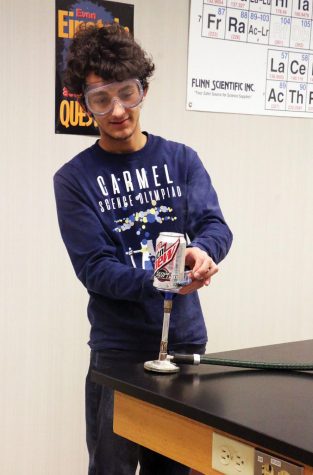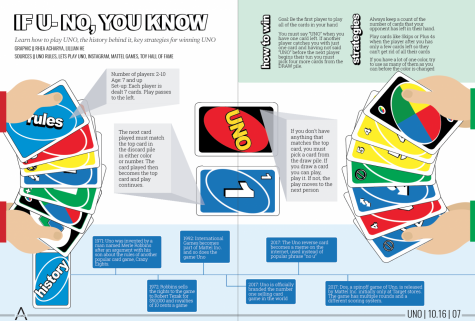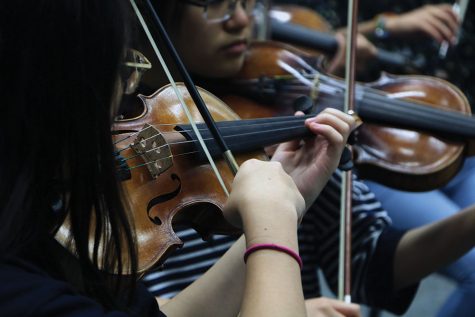One Last Goodbye
Student, teacher, mental health coordinator discuss dealing with death of loved ones, grieving process associated with loss
Senior Katy Carson said she loves lemon-flavored foods. When she was in seventh grade, Carson said she really enjoyed baking, so she would constantly be creating some form of baked good for her grandfather. This eventually progressed to being solely lemon-flavored foods, and Carson said it became her and her grandfather’s “thing” to have lemon cake every day. The lemon became a symbol with which she remembers her grandpa.
When Carson was in first grade, her grandpa was first diagnosed with lymphoma. By the following year, he was in remission, and Carson and her family breathed a sigh of relief. Carson said her grandfather always called after doctor’s appointments, but after an appointment seven years later, he didn’t call. The cancer was back. This time, he wouldn’t go into remission.
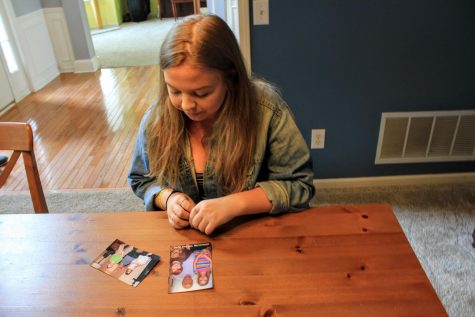
Senior Katy Carson looks at photos of her grandfather in her dining room. Her grandfather passed away from cancer five years and his death has been the most profound she has experienced.
According to Carson, the doctor recommended that her grandpa either undergo chemotherapy—which could be fatal—or go into hospice care. Hospice care, according to the National Institute of Health, focuses on comfort for the patient rather than a cure. Carson’s grandfather opted for hospice care and moved into the house with Carson and her immediate family for six months until he died five years ago.
Carson said her grandfather’s death broke her. She was in her bedroom when her dad told her, and she said she couldn’t even walk into her room for two weeks afterward because it reminded her of the bad news.
“I never dealt with anything like that with somebody I was close to as I was to him,” Carson said. “Grandpa is the only person (whose death has) really affected me.”
This was Carson’s first major experience with loss, and mental health coordinator Stephanie Whiteside said her response is not unusual.
“Feelings of grief can throw (people) off a little bit if they haven’t experienced (them) before because people often think you cry and you’re sad, but sometimes people aren’t prepared for the intense anger they can also feel when they lose somebody or the guilt that they can feel when they lose somebody,” Whiteside said.
According to a study conducted by psychology professors in the Netherlands, South Africa and China, self-blame and regret are the most frequently identified forms of guilt surrounding loss in the current research. Carson said she experienced this first-hand. Her parents told her that her grandpa wasn’t going to make it through the night, and she went to change into more comfortable clothes before saying goodbye. Before she finished, he was gone.
“I had the chance to say goodbye to this awesome guy that I loved, and I didn’t. For a long time, I couldn’t forgive myself,” Carson said.
For other people, like social studies teacher Robert Elder, it’s not the first loss that affects them the most. Elder lost his daughter to Ewing sarcoma in 2012 when she was 11 years old. Although this was not his first experience with loss, Elder said his daughter’s death eclipsed that of other family members.
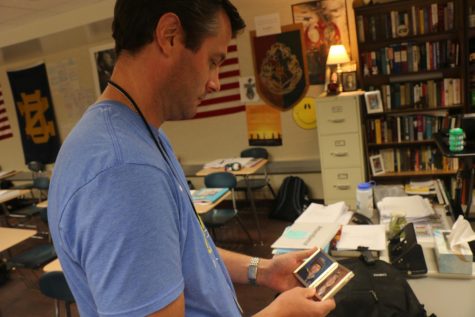
Robert Elder, government and U.S. history teacher, looks through photos of his daughter who passed away at the age of 11. Despite the devastation of this event, Elder said it was what prompted him to return to teaching.
“As a parent, you stand there and you look at (yourself) and you wonder, “They’re such strong hands. Why can’t I hold onto this person? Why can’t I stop this from happening? Why not me?’” Elder said. “Just give (the disease) to me and let me do it. Don’t make her do it. Have I been through deaths and things like that before and watched family members die? Yeah, but losing a child is different.”
Whiteside said over time people learn how to cope better with loss, but it doesn’t necessarily “get better with time” as the cliché goes. Carson said in the past year, she realized her grandpa didn’t want her to watch him die, and she said this knowledge made it easier for her to deal with his death. To honor his memory, Carson got a tattoo of a lemon.
“I decided to get the tattoo just to remind myself of him and that he loved me, and I miss him. He’s always there even if he’s not here,” she said. “(The tattoo) has been a nice little reminder because when I am really stressed over a test, and I see it, it just makes me smile.”
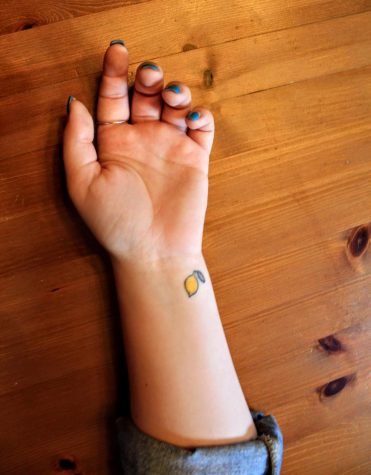
Senior Katy Carson displays the tattoo she got on her wrist to commemorate her late grandfather.
Elder said he took a different coping route. His daughter’s death altered his career path. He was a teacher before becoming an attorney, but he went back to teaching nine months after his daughter’s death.
“For me, teaching is a way of watching other young people achieve dreams my daughter wasn’t able to achieve,” he said. “I found that the best way for me to honor her memory is to give back to other students because that’s what I do best.”
Learning to deal with loss is a process, and according to PsychCentral, everyone grieves differently. People who experience loss go through some form of the five stages of grief—denial and isolation, anger, bargaining, depression and acceptance—before settling down and accepting that their loved ones are gone. However, there are ways in which people surrounding the grieving can help.
“It’s big to avoid forcing (those who have lost someone) to talk about it if they’re not ready to,” Whiteside said. “Letting them know that they can talk to you when they need to talk and making sure that they’re just emotionally and physically present (allows) them to talk about it and (allows) them to feel that sadness.”
Carson said she has found that although the pain is still there, she has learned how to manage it.
“It does hurt less. It gets easier, and I know some days you’ll wake up and you’ll just want to sit in bed and miss them, but you’ll get used to it,” Carson said. “You just have to know that they are there even when they are not here. They’re still watching over you, and they’re still taking care of you, and you just have to come to terms that they are still doing all the things that they did, just in a different way now.




